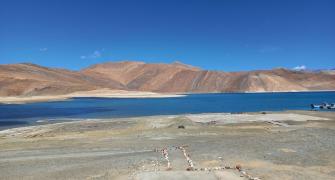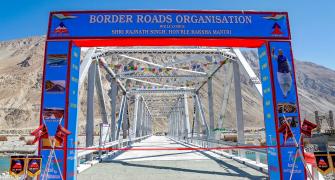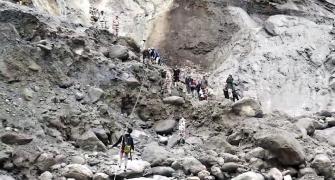Expressing concern over the rising number of natural disasters in some border states and union territories, Defence Minister Rajnath Singh Friday said there is a need for a detailed study to find out if India's adversaries are behind it.

Rajnath sees red in rising natural disasters in border states, says detailed study needed
After dedicating 35 border infrastructure projects worth Rs 670 crore at an event in Uttarakhand's Joshimath, Singh said the increase in number of such incidents in the border regions cannot be ignored and that the government will seek cooperation from friendly countries on the issue, if needed.
Without naming any country, Singh said a study needs to be conducted to find if there is also a role of "our adversaries" in it.
His comments came against the backdrop of China ramping up border infrastructure along the nearly 3,500 km-long Line of Actual Control that criss-crosses the frontier regions of Ladakh, Uttarakhand, Arunachal Pradesh, Sikkim and Himachal Pradesh.
In his address, Singh specifically drew attention to the increasing number of natural disasters in some border states and Union Territories including Uttarakhand, Ladakh, Himachal Pradesh and Sikkim in recent years, noting that many experts believe that climate change is the reason behind these incidents.
Climate change is no longer just a weather-related phenomenon but is also linked to national security, he said, adding the Ministry of Defence is taking this very seriously and will seek cooperation from friendly countries in this regard, if needed.
"The frequency of natural disasters has risen in some states and union territories like Uttarakhand, Himachal Pradesh, Sikkim and Ladakh. Experts believe it is linked with climate change. But I think a study needs to be conducted to find if there is also a role of our adversaries in it," Singh said.
"We feel the subject deserves a detailed study for which the help of friendly countries can also be taken if needed," he said.
Referring to large migration from border areas in Uttarakhand, Singh termed it a matter of concern and said that Prime Minister Narendra Modi and Chief Minister Pushkar Singh Dhami are taking schemes related to infrastructure development to the last person.
The aim is to cover the development journey from the "seas to the borders", he said.
The defence minister stressed that connectivity is being provided to every border area in the country through roads, bridges and tunnels, describing the work as not only of strategic importance, but also pivotal for the welfare of the people residing in these regions.
"People living near the borders are no less than soldiers. If a soldier protects the country by wearing a uniform, the residents of border areas are serving the motherland in their own way," he said.
Singh said the Modi government has changed the approach adopted by previous governments that the border areas are buffer zones between the plains and the potential adversary.
The present government considers border areas a part of the mainstream and not a buffer zone, he emphasised.
"There was a time when border infrastructure development was not given much importance. Governments used to work with the mentality that the people living in the plains are the mainstream people," he said.
"They were worried that the developments on the border might be used by the adversary. Due to this narrow mentality, development never reached the border areas. This thinking has changed today," Singh said.
Under the leadership of Prime Minister Modi, the central government is committed for the development of border areas, keeping in view the nation's security needs, he said.
"We do not consider these areas as buffer zones. They are a part of our mainstream," he added.
The defence minister said the government's approach shows a new confidence of 'New India', which will not wait for potential adversaries to reach the plains to deal with them.
"We are developing infrastructure on the mountains and deploying the troops on hill borders in such a way that it is ensuring the safety of the people there, and helping the military to effectively deal with our adversaries," he said.
In his remarks, Singh commended the Border Roads Organisation for strengthening the border infrastructure.
The 35 projects inaugurated on Friday include 29 bridges, and six roads for Uttarakhand, Jammu and Kashmir, Ladakh, Himachal Pradesh, Mizoram and Arunachal Pradesh.
Out of the 29 bridges, 10 are located in the union territory of Jammu and Kashmir, eight in Arunachal Pradesh, six in Ladakh, three in Uttarakhand, one in Himachal Pradesh and one in Mizoram.
Out of the six roads three are in Ladakh, two in Sikkim and one is located in Jammu and Kashmir.









